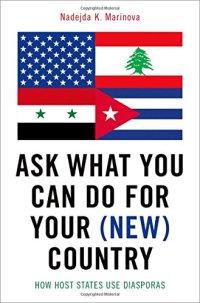
Ebook: Ask what you can do for your (new) country : how host states use diasporas
Author: Nadejda K Marinova
- Tags: Ethnic groups -- Political activity., Immigrants -- Political activity., Transnationalism., International relations., Globalization -- Political aspects., SOCIAL SCIENCE / Emigration & Immigration
- Year: 2017
- Publisher: Oxford University Press
- City: New York
- Edition: 1
- Language: English
- pdf
Within recent years a new body of literature has emerged within international relations on transnationalism and foreign policy. This literature has thus far focused on the strategic relationship between home states and their ethnic lobbies abroad, often with regard to remittances to and politics in the home country. This book breaks new ground in that it develops a theory about when, how and for what reasons host states use diasporas and the ethnic lobbies they generate to advance foreign policy goals.
Ask What You Can Do for Your (New) Country focuses on a previously unexamined phenomenon: how host governments utilize diasporas to advance their foreign policy agendas in mutually beneficial ways. As was demonstrated in the run-up to the 2003 invasion of Iraq, when Iraqi exiles testified that Saddam Hussein possessed weapons of mass destruction, ethnic lobbies have been utilized strategically by the United States (and other countries) for the promotion of political objectives. Host states have even promoted the creation of such ethnic lobbies for this purpose. As Nadejda K Marinova shows, those who participate in such lobbies are of a particular subset of émigrés who are politically active, express a sustained vision for homeland politics, and who often have existing ties to political institutions within the host state. These groups then act as a link between the public and officials in their home state, and other (generally less politically active) members of the diaspora via a coordinated effort by the host state. She develops a theoretical model for determining the conditions under which a host state will decide to promote and utilize an ethnic lobby, and she tests it against eight cases, including the Bush Administration's use of the American Lebanese Cultural Union and the World Council for the Cedars Revolution in developing policy towards Lebanon and Syria, the Iraqi National Congress in endorsing the US invasion of Iraq, the Cuban-American Committee's cooperation with the Carter administration in attempting to normalize relations with Cuba, and the International Diaspora Engagement Alliance (IdEA) launched by Secretary of State Hillary Clinton in 2011 to promote economic development in a number of countries.
Ask What You Can Do for Your (New) Country focuses on a previously unexamined phenomenon: how host governments utilize diasporas to advance their foreign policy agendas in mutually beneficial ways. As was demonstrated in the run-up to the 2003 invasion of Iraq, when Iraqi exiles testified that Saddam Hussein possessed weapons of mass destruction, ethnic lobbies have been utilized strategically by the United States (and other countries) for the promotion of political objectives. Host states have even promoted the creation of such ethnic lobbies for this purpose. As Nadejda K Marinova shows, those who participate in such lobbies are of a particular subset of émigrés who are politically active, express a sustained vision for homeland politics, and who often have existing ties to political institutions within the host state. These groups then act as a link between the public and officials in their home state, and other (generally less politically active) members of the diaspora via a coordinated effort by the host state. She develops a theoretical model for determining the conditions under which a host state will decide to promote and utilize an ethnic lobby, and she tests it against eight cases, including the Bush Administration's use of the American Lebanese Cultural Union and the World Council for the Cedars Revolution in developing policy towards Lebanon and Syria, the Iraqi National Congress in endorsing the US invasion of Iraq, the Cuban-American Committee's cooperation with the Carter administration in attempting to normalize relations with Cuba, and the International Diaspora Engagement Alliance (IdEA) launched by Secretary of State Hillary Clinton in 2011 to promote economic development in a number of countries.
Download the book Ask what you can do for your (new) country : how host states use diasporas for free or read online
Continue reading on any device:

Last viewed books
Related books
{related-news}
Comments (0)